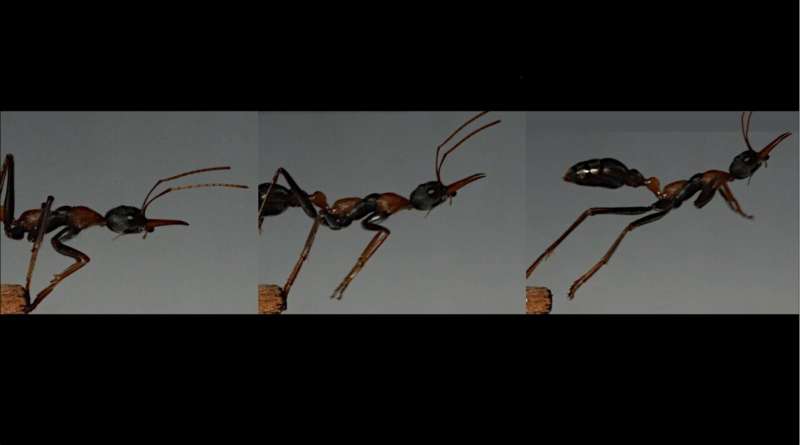This article has been reviewed according to Science X's editorial process and policies. Editors have highlighted the following attributes while ensuring the content's credibility:
fact-checked
trusted source
proofread
How to say 'jumping ants' in Uchinaaguchi

Recent publication of OIST research findings in the journal Integrative Organismal Biology likely marks the first use of Uchinaaguchi, the indigenous Okinawan language, in a scientific research publication. OIST researchers and staff translated an abstract of the paper entitled, "Parallel and Divergent Morphological Adaptations Underlying the Evolution of Jumping Ability in Ants" into this endangered language.
"When the opportunity arose to highlight the study's findings in languages other than English, I thought of Uchinaaguchi as a way to link OIST research to Okinawan culture," notes OIST Prof. Evan Economo, who leads the Biodiversity and Biocomplexity Unit and is senior author on the study. "I have been impressed by the efforts of OIST's Eedee group who have been working to raise the profile of Uchinaaguchi on campus. So, I asked Misato Matsuda and Chiaki Chibana, OIST staff and Eedee members, for their help."
The research explains the phenomenon of "jumping ants." Ants are known for walking, climbing, and sometimes carrying off part of your lunch. But a few types of ants have a rare ability: they can jump. Researchers at OIST were curious about what gives ants these abilities—and used X-ray scanning and 3D modeling to uncover how these ants can leap many times their body length.
Many insects jump, but typically they use mechanisms to store elastic energy and release it quickly. "This is what happens when you snap your fingers or use a bow and arrow—elastic energy is stored and quickly released," explains Prof. Economo. However, the researchers, including first author and OIST Ph.D. student Lazzat Aibekova, found a different jumping mechanism in ants, which showed a reorganization and expansion of specific muscles in the thorax.
"Interestingly, even distantly related ants evolved similar changes to enable the jumping ability, with slight variations depending on which legs are involved in the motion," Prof. Economo says. "This contributes to our understanding of how evolution solves engineering problems and highlights the question of why similar solutions often emerge even among distantly related organisms."
Translation of this research into Uchinaaguchi presented challenges as well as opportunities notes Matsuda, who along with Chibana, undertook the translation. "The central obstacle was that Uchinaaguchi did not have a large vocabulary due to the limited inheritance over time," says Matsuda. "For example, Modern scientific designations and concepts such as 'muscle' and 'cross-sectional area' did not appear in the dictionary."
To grasp and comprehend the scientific expressions, Matsuda engaged in conversations with scientists and translated their work following guidance from a linguist. Subsequently, she called upon experts closer to home, her parents and other elderly seniors local native speakers who assisted with the final review.
"The project was a complex process that was made possible by the support of many people," Chibana says. "In order to preserve our Uchinaguchi, it is important to incorporate it into our daily lives. This project has clearly shown us that we can open up new avenues by incorporating Uchinaguchi into the scientific field and other various scenes."
"It was a process of reaffirming our connection to Okinawa," said Matsuda. "I hope that through the story of Tunjuru Aikoo—'jumping ants' in Uchinaaguchi—a deeper understanding of the unique and important role that OIST plays in Okinawan society will emerge."
More information: L Aibekova et al, Parallel And Divergent Morphological Adaptations Underlying The Evolution of Jumping Ability in Ants, Integrative Organismal Biology (2023). DOI: 10.1093/iob/obad026
Provided by Okinawa Institute of Science and Technology



















